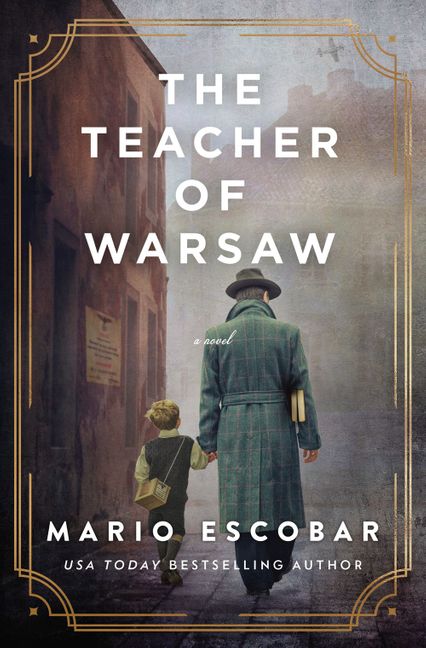The Teacher of Warsaw by Mario Escobar
Review by Michael Attard
This historical fiction is centered upon a diary of a few months written in 1942 in Warsaw, Poland. The memoir belonged to Henryk Goldszmit, a writer, radio host, columnist, and director of two children’s orphanages. The novel by Mario Escobar revolves around this short but shameful time in history. It was Goldszmit’s life of dedication to children that inspired the Declaration of the Rights of the Child, adopted by the United Nations in November 1959.
The novel begins with the German invasion of Poland in 1939, which triggered the start of World War II in Europe. The fictional protagonist’s name is Janusz and his long-time friend, Stefa, is encouraging him to leave Poland. He is in his sixties, running an orphanage that is home to 200 Jewish children and has no intention of going anywhere. He never married or had children of his own, for which he has his reasons.
Daily bombings quickly make everything difficult; basic supplies become scarce. A woman by the name of Agnieszka arrives with her ten-year-old son, Henryk. They have been referred to Janusz by a former friend. His practical mind turns them away, but he suddenly has a change of heart and allows them to stay. The mother and son become main characters, but the author’s character development is weak in my opinion.

This is the case throughout the story. One of the orphanage’s tutors tells Janusz that she and her boyfriend have a chance to get out of the country. The escape fails and they are killed. Of course, this is an undeniably horrible event, but the woman is introduced only a few lines before she is killed. From a writing perspective, if the reader had known more about this woman, a stronger emotional response would be elicited.
The use of descriptive language and similes helps to keep the reading interesting. Many scenes are simply put, such as, “the light of the candles overcame the darkness inside the building.” Others provide interesting descriptions of how the characters were, such as, “heartened to see a small light of hope shining in the eyes of one hungry child.” Before all the terror began, the author tells us that, “the students resisted the end of summer with the ferocity of a shipwreck survivor clinging to his life jacket in the middle of a storm.”
Pertaining to but distinct from the story is the universal message of the power of love. Janusz says, “The best lesson we can ever teach is to show love to those around us without expecting anything in return.” On optimism, the author writes, “There are no bad seeds, just rough patches of land.” With respect to happiness, he says, “We look for it outside of ourselves, but it’s something that’s in our minds.” Realistically though, considering the actual history, the often-professed hopeful statements struck me as platitudes.
The story progressed slowly with every day worse than the day before. Janusz spent a great deal of time soliciting help from the few people who could offer any. Whether it was the Jewish council appointed by the Nazis, the Jewish police, or his network of legal and illegal associates, he managed to keep the children fed, even if just barely. The people changed but the worsening struggles continued. This created a plodding-along effect in the reading, which meant that I was more inclined to want to get through a passage as opposed to being piqued by curiosity to know what happened next. In fairness, the nature of the story, and the reality of the characters’ lives just hoping to see tomorrow, would create a depressing state of affairs where all there was to do was plod along.
The story is as much about Janusz’s inner struggle as it is the physical fight to keep the children alive. He is often psychologically drained. He says, “I felt the weight of the world on my shoulders. I felt guilty for having abandoned all the sick children when I stopped practicing medicine. … I felt guilty for wasting the chance to do something meaningful with my life. All of the pain around me made me feel helpless.” But he continues to pick himself up and encourages those with him. “We cannot avoid depressing thoughts, but we can keep them from controlling us.”
This is also a story of human dignity. Jews were required to wear an armband with the Star of David. There is an account where Janusz, without an armband, is confronted by a Jewish policeman. The absence of the armband and his curt reply earn him a beating. Apparently, it is true that various German officials inexplicably overlooked the protagonist’s real self’s refusal to wear an armband.
With another winter approaching, it was clear that many of the children would not survive. Plans to get children out were stepped up, but only a few, usually those with blue eyes and fair skin, escaped using false documents.
Janusz has another chance to escape, but he adamantly refuses to abandon his children. “Soldiers had opened the train cars, and the children started to file in.”
The Reviewer
Michael Attard is a Canadian who has lived in Gwangju since 2004. Though officially retired, he still teaches a few private English classes. He enjoys reading all kinds of books and writes for fun. When the weather is nice, you may find him on a hiking trail.




